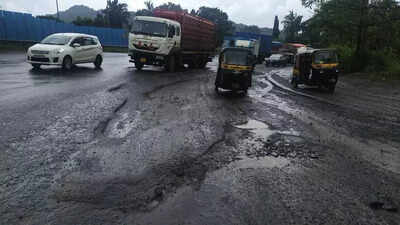ARTICLE AD BOX

Thane: Despite a slew of proposed remedies both at the state and local level — including restrictions on heavy vehicles — city transport experts and activists have urged the need for immediate, low-cost, high-impact interventions to resolve the issue of congestion and slow- moving traffic on the Ghodbunder Highway."Long-term infrastructure projects are important but won't help resolve the present chaos choking one of Mumbai's key arterial routes. While state agencies mull highway widening and other future-facing developments, what is needed is an immediate solution with active participation from residents," echo urban planners and activists.Town planner Sulakshana Mahajan term the ongoing Ghodbunder highway widening project as misguided, stressing the need for a separate corridor exclusively for inter-state and outstation vehicles to decongest local traffic.
"The service lanes were largely occupied for parking and if they are either used as dedicated bus routes or restored for city traffic, it will greatly decongest the main carriageway," said another expert.
Poll
Would you support a tax on private vehicles to promote public transport?
BJP MLA Sanjay Kelkar also opposed the highway project in its current form, calling instead for the reinstatement of service roads. "These roads were crucial for emergency services like ambulances and fire brigades.
Removing them has put lives at risk," said MNS's Avinash Jadhav.Transporters, meanwhile, argue that rather than banning outbound trucks, authorities should create dedicated lanes for them and enforce strict penalties for non-compliance. "This keeps freight moving while preserving road space for city commuters," said a Mumbai-based logistics expert.Activists proposed several people-centric solutions: launching high-capacity share taxi routes, promoting carpooling within housing societies, and reintroducing pre-COVID practices like shared commuting.
"Maxi cabs with 10-seater capacity could drastically reduce the number of smaller, slower-moving autos on Ghodbunder," said local resident Sunil Dodeja in an email to TOI."Often societies have people travelling to nearby destinations but using their own cars, which can be averted if they form small groups and have their own micro-level car-pooling system on social media groups. This will not just be economically viable but also ease congestion until mega projects are executed," said a resident who was part of a similar initiative.A group of resident activists were also considering writing to major companies to assist in the situation and encourage work from home for their employees staying along this part of the suburbs or stagger their work timings.Mahajan further advocated aggressive policy shifts — like those in global cities—where private vehicle usage is taxed, and public transport is prioritised and subsidised. "We need a strict transport policy that incentivises public transit and discourages unnecessary private vehicle usage," she said, adding that the govt must ensure metro and bus systems are running at full capacity.Satyakirti Patil, director of sales at Vadodara-based Nutran which is executing the pod car project in Thane along with MMRDA, said alternative last-mile connectivity was the need of the hour.



.png)
.png)
.png)
















 1 hour ago
3
1 hour ago
3









 English (US) ·
English (US) ·